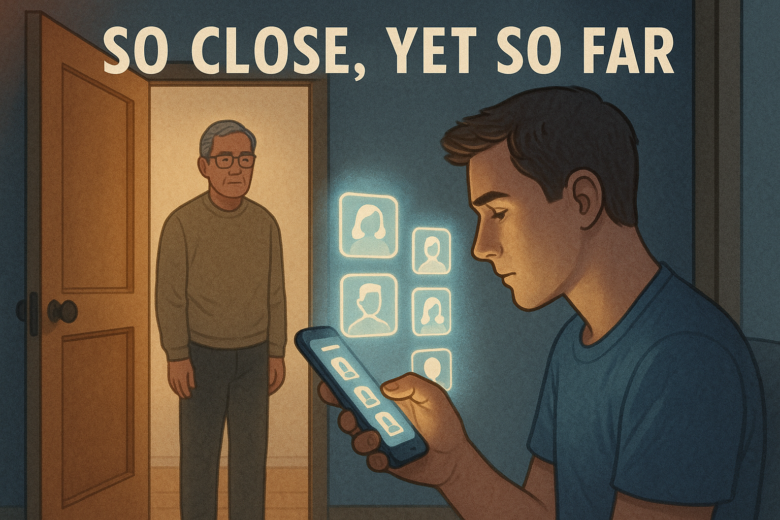Fun fact: A 2024 study conducted across 51 countries found that individuals are more likely to compete with their own compatriots than with strangers from other countries, suggesting that people may perceive distant strangers as less threatening than their immediate neighbours.
You might not know your neighbour’s name, but you trust the opinions of a stranger named “BookLover_92” on Goodreads. You might avoid small talk in your apartment corridor, but freely Venmo ₹5,000 to someone from an Instagram story sale. In fact, you might hesitate to borrow sugar from next door, but you’ll book a ₹10,000 Airbnb (Air Bed and Breakfast, an online lodging marketplace) after reading 23 glowing reviews from people you’ll never meet.
We are living in a strange age—where proximity has lost to profile pictures, and algorithms have replaced alley chats. Why is it that, in a hyperconnected world, we feel more emotionally safe with digital strangers than with physical neighbours?
The Rise of the Trust Economy
Trust used to be built on proximity. You knew your grocer, your postman, your barber. You trusted them because you saw them every day. But today, we live in a platform world. Trust is built not by proximity, but by ratings, algorithms, and social proof.
Consider:
- We book rides through Uber Technologies Inc. (a global ride-sharing app) by trusting a driver we’ve never met—because 200 people rated them 4.9 stars.
- We buy gadgets from Amazon.com Inc. (an American multinational e-commerce company) based on user reviews from total strangers.
- We send our kids to online tutors on UrbanPro (an Indian tutoring platform) based on bios, feedback, and profile photos.
We’ve outsourced trust to the crowd. And in doing so, we’ve created a paradox: we trust strangers who appear transparent more than familiar faces who remain emotionally opaque.
Why We Trust Online Strangers
Let’s unpack the psychology behind this:
The Illusion of Intimacy
Online profiles, reviews, and bios give us curated, bite-sized insights into strangers. A neighbour may be a blank slate—but “FitnessGuy2020” on Reddit has shared his entire weight-loss journey.
This curated sharing creates parasocial bonds—one-sided emotional relationships where we feel we “know” someone just because they’ve let us into their digital lives.
Control Over the Interaction
Online, we choose when to engage. We can ignore, block, mute, or ghost. But with neighbours, the relationship comes with expectations, awkward silences, and unspoken social contracts.
The internet lets us build asymmetrical intimacy—connections without the risk of real-life mess.

Shared Values Over Shared Walls
In cities, your next-door neighbour might not speak your language or share your worldview. But online, you can find someone 8,000 km away who gets your memes, your beliefs, your fandom.
Shared values now outweigh shared geography.
Ratings and Reputation Systems
Unlike real life, the internet gives you instant reputation metrics. Someone with 10,000 followers, 4.8 stars, or glowing testimonials earns insta-trust. Your neighbour? No reviews. No followers. Just suspiciously quiet.
It’s not fair—but it feels safe.
The Neighbour Disconnect
Ironically, we trust online strangers because they feel predictable. But neighbours? They’re messy. Real. Flawed.
In a 2023 Indian study by Lokniti-CSDS (Centre for the Study of Developing Societies), over 60% of urban youth admitted they had no emotional connection with their immediate neighbours. Many cited “lack of time,” “awkwardness,” or “no common ground.”
This trust deficit is amplified by:
- Gated communities where security systems discourage casual interaction.
- Frequent mobility—renters rarely stay long enough to form deep bonds.
- Cultural caution—urban families, especially in metros, are increasingly private.
In other words, we’ve been conditioned to treat proximity with suspicion and distance with openness.
Case Study: The Instagram Confidence Paradox
Meet Aanya, a 24-year-old graphic designer from Pune. She follows a lifestyle blogger named Rhea, based in London. “I’ve never met Rhea,” Aanya says, “but I trust her skincare tips more than my own mom’s!”
Why?
Because Rhea’s content feels relatable. Because she posts daily updates. Because she replies to comments.
Meanwhile, Aanya doesn’t know the name of the woman who lives in the flat above hers. “We’ve never said more than a polite hello.”
It’s not about physical presence anymore. It’s about perceived authenticity—even if that authenticity is edited, filtered, and monetized.
When Trust Goes Too Far
Of course, there’s a dark side to this digital trust culture.
People have been:
- Scammed on Facebook Marketplace.
- Catfished on dating apps.
- Defrauded via fake crypto schemes endorsed by influencers.
Online trust is thin trust—easily given, easily broken. Unlike thick trust, which is built slowly through repeated, face-to-face interaction.
We trust digital strangers too quickly because they fit into our curated echo chambers. But real life requires patience, vulnerability, and—yes—awkwardness.

Are Neighbours Making a Comeback?
Interestingly, there’s a slow countertrend brewing.
During the COVID-19 lockdowns, people rediscovered their neighbours. From grocery help to emotional support, real proximity mattered when Wi-Fi couldn’t deliver toilet paper.
In cities like Bengaluru, platforms like Nextdoor India and MyGate (a gated community management app) are helping residents coordinate, chat, and build trust with those nearby.
Community WhatsApp groups, once reserved for missing milk packets, now host yoga sessions, blood donation drives, and birthday shoutouts.
The Way Forward: Blending Digital and Real-World Trust
The solution isn’t to stop trusting online strangers. It’s to balance that trust with effort in the real world.
Here’s how:
- Say hi first. Yes, it’s awkward. But someone has to break the ice.
- Attend or organize a local event. Diwali potluck? Tree planting? Game night?
- Use technology for proximity. Instead of following strangers 10,000 km away, follow your neighbour on Instagram—or better yet, talk to them.
- Redefine community. It’s not just fandoms and followers. It’s also families in flats next door.
In a world saturated with curated digital interactions, authentic local connections are the next luxury.
Conclusion: The Stranger We Know and the Neighbour We Don’t
We trust strangers online more than neighbours because digital trust is easier, cleaner, and under our control. But it’s also fragile and often shallow.
Neighbours are messy, flawed, and real. Which is exactly why they matter.
Because ultimately, it won’t be your favourite influencer who lends you sugar, walks your dog when you’re sick, or holds your hand during an earthquake. It will be the person behind that closed door, one floor above or below you—if you let them in.
Author’s Note:
Isn’t it curious how we can build trust across screens but struggle to knock on the door next to us? The digital world has opened our hearts in unexpected ways—but maybe that same openness can ripple into real life too. Maybe the next great connection isn’t hiding behind a username, but just across the hallway. All it might take is a smile, a shared cup of chai, or the courage to say, “Hi, I’ve been meaning to introduce myself.” Trust, after all, grows wherever we choose to nurture it.
G.C., Ecosociosphere contributor.
References and Further Reading:
- Why People Trust Online Strangers – Pew Research
- India’s Urban Youth and Neighbour Disconnect – CSDS Survey
- Better is a stranger faraway than a nasty neighbour nearby




